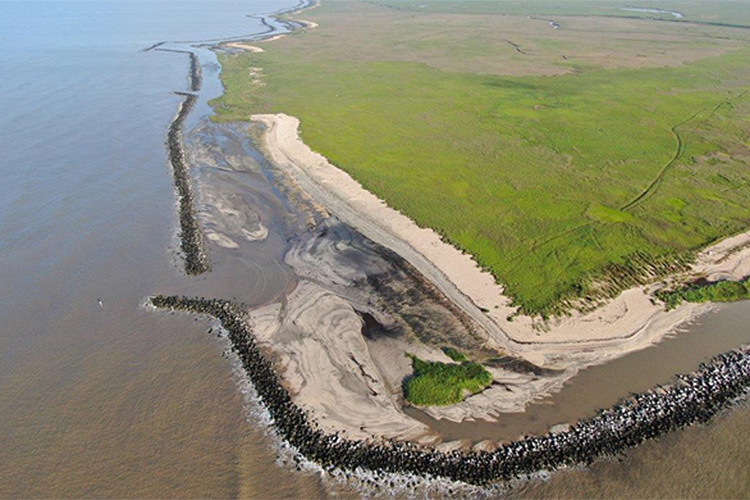Rockefeller Refuge Project Protects Vulnerable Louisiana Shoreline
Posted
Last Updated
NOAA and partners have completed construction on the Rockefeller Refuge Gulf Shoreline Stabilization Project in southwest Louisiana. This project will reduce erosion along the Gulf of Mexico shoreline and protect valuable marsh habitat in Rockefeller Wildlife Refuge.
Established in 1920, the 71,000-acre Rockefeller Wildlife Refuge is a sanctuary for wildlife and fish, as well as an outdoor laboratory where many wetland studies are conducted. The refuge is described as one of the most biologically diverse wildlife areas in the country. It provides habitat for abundant fish and shellfish populations such as shrimp, crab, red drum, speckled trout, black drum, and largemouth bass. Research on wetlands, fisheries, and wildlife conducted in the refuge has led to more than 350 articles published in peer-reviewed journals.
However, the refuge also has one of the most rapidly eroding shorelines in Louisiana. Shoreline erosion in this area averages more than 50 feet each year. Since the refuge was founded, it has lost more than 15,000 acres to coastal erosion.
To protect this critical habitat, NOAA partnered with the Louisiana Coastal Protection and Restoration Authority and the Louisiana Department of Wildlife and Fisheries. We secured $34 million from the Coastal Wetlands Planning, Protection and Restoration Act (CWPPRA) program to install a new section of breakwater along four miles of shoreline in the refuge. The new breakwater, completed in June 2020, protects more than 250 acres of coastal marsh. Due to the soft soil found in the area, an innovative lightweight material was used to construct the breakwater and reduce sinking. The design also incorporates gaps at regular intervals that allow water and fish to pass through.
Since 1990, the CWPPRA Program has served as the primary means for responding to coastal wetland loss in Louisiana. NOAA has been the federal sponsor for construction of nearly 30 wetland restoration projects through CWPPRA, restoring more than 12,500 acres of vulnerable coastline. Earlier this year, two additional NOAA-sponsored CWPPRA restoration projects were approved for $30 million in funding.
READ MORE at fisheries.noaa.gov

